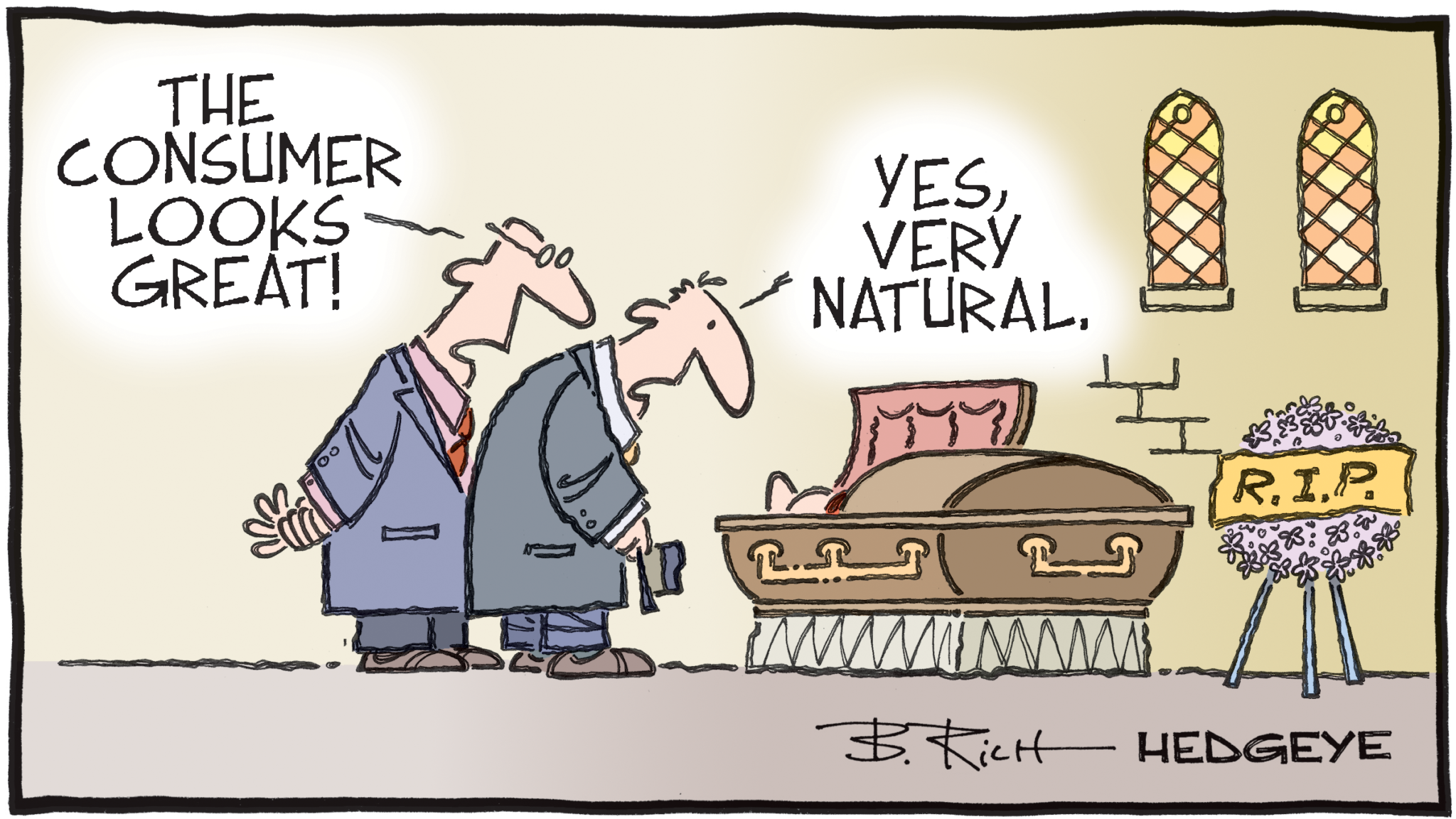
The week is coming to an end, and nothing has fundamentally changed. Questions about customs duties remain the same. We keep going in circles, living to the rhythm of the U.S. President’s press conferences. Peace in Ukraine and the strengthening of European defense remain highly relevant topics, but for now, they no longer seem to interest the markets much. Macroeconomics has largely taken a back seat, but we will return to it next week. As for yesterday’s session, the focus was primarily on a topic that had been largely set aside for some time: the consumer’s financial health.
Before
A few years ago, a lot of emphasis was placed on the fact that the American consumer was the engine of growth—without them, U.S. growth couldn’t be sustained, and the entire economy would suffer. In recent years, however, no one seems to care much about the consumer’s financial health anymore. Instead, the focus has shifted to the growth of new technologies, and what Joe American does with his money has become an afterthought.
Right now, we know that the average American is taking on debt to finance their personal battle against inflation. They’re questioning whether it’s worth buying a home with mortgage rates so high—yet at the same time, homeownership remains the ultimate symbol of the “American Dream.” And more recently, Walmart’s earnings report yesterday suggested that Joe American is tightening his belt and starting to be more mindful of his spending.
The world’s largest supermarket chain released mixed results, stating that customers are shifting more toward lower-margin products. Translation: they’re opting for cheaper goods. These “new consumption habits” have led Walmart’s management to anticipate potentially tougher quarters ahead. The stock took a hit, dropping over 6%, and the entire retail sector suffered as investors started to wonder if things were better in the past and whether retail sales might become a problem in the coming months. This sounds worrying at first glance, but fortunately, Wall Street has an incredible ability to separate the wheat from the chaff and find a silver lining in bad news.
Pressure, but Not Too Much
Walmart’s announcement wasn’t great, especially considering that consumer spending may be weakening. That’s why the market was under slight pressure yesterday, and the S&P 500 failed—this time—to close at an all-time high. A wave of fear started creeping into the indices, adding a new layer of concern alongside tariffs, DeepSeek, and the fact that the Magnificent Seven can no longer lead the charge.
But the panic didn’t last long. Analysts quickly stepped in to reassure the market and prevent a major pullback. From another perspective, one could argue that “if consumers change their spending habits,” inflation might ease, paving the way for a more favorable outlook on interest rates. Additionally, analysts reminded us that Walmart is a conservative company—when they say the next quarter “won’t be easy,” it’s more about preparing investors “just in case” rather than signaling a crisis. Walmart has never been one to release overly optimistic forecasts.
The result? The damage was contained, but the Dow Jones still lost 1%—after all, Walmart is part of the index, meaning one-thirtieth of it fell by 6.5% in a single session. That kind of drop is bound to have an impact.
End of the Week and Tariffs
In Europe, the discussion around tariffs continued. Trump’s announcements regarding cars and semiconductors put pressure on certain segments of European indices, but overall, the damage wasn’t too bad, and the selling pressure felt on Wednesday eased significantly. The CAC 40 even managed to close in positive territory—just barely, but still in the green.
Europe, however, seems unsure of where to focus its attention. On one hand, there are tariffs, though for now, there’s no need to panic too much. On the other, hopes for peace in Ukraine could give the markets a boost. On that note, it’s amusing to observe that February 24 will mark three years since Russian forces entered Ukraine, and yet the markets have climbed 60% since then—62% for the DAX, 41% for the CAC, and 68% for the Nasdaq. And now we’re being told: “If the war in Ukraine ends, it will be a relief for the markets, which will regain momentum and feel less pressure.”
Well, that’s for sure—60% gains in three years, and the end of the war will supposedly make us feel even better about the bull market. Basically, if there had been no war in Ukraine, the DAX would be at 55,000, the CAC 40 above 15,000, and I don’t even want to think about tech stocks. I’m being sarcastic, of course—but I didn’t start it.
In any case, the good news is that hopes for peace are acting as support for European markets, which are already looking forward to better days, while assuming the tariff situation will sort itself out. In summary, the markets remained solid yesterday—slightly down, but still resilient.
Meanwhile—and I know I keep mentioning him—one person who never misses an opportunity to stay in the spotlight is Macron. He has made Ukraine his number one topic in every possible way. He no longer governs France (and Bayrou doesn’t either—he has other issues), but he lives solely for and through Ukraine. With summits every 48 hours, interviews, and social media appearances, he’s everywhere. It’s a convenient way to distract from other matters—and to remind Trump that he exists.
Most recently, he has proposed launching a large-scale loan to support Ukraine, which will surely solve everything.

Asian Markets
This morning, most Asian markets were in the green, some more than others. The usual concerns about tariffs and high U.S. interest rates linger—though the U.S. doesn’t seem to care and keeps pushing higher. Meanwhile, Japan is barely inching forward with a 0.2% gain, China is up nearly 0.9%, but today’s gold medal goes to Hong Kong, where the Hang Seng Index soared over 3% thanks to Alibaba’s stellar earnings. Turns out, consumers aren’t doing too badly—it’s just a different kind of spending, in a different place.
Alibaba’s results sent a wave of optimism through the markets, leading to two key takeaways:
- First, the Chinese retail giant posted some seriously impressive numbers.
- Second, we might—just might—be seeing signs that China is waking up. Yes, I know it’s too soon to say for sure, but one can dream.
And if we dig a little deeper, we could even say that AI is proving to be a game-changer. Alibaba made sure to highlight its AI strategy during its earnings call, stating that: “Alibaba Group’s AI strategy has helped drive third-quarter revenue growth at its fastest pace since late 2023, as the e-commerce giant navigated fierce domestic competition and a slowing Chinese economy.” As a result, the company reported a 7.6% revenue increase to $38.5 billion. The stock jumped over 8%, and at one point after the market opened, it was up as much as 13%.
Elsewhere, oil inventories pushed crude prices higher—WTI is currently at $72.30. Gold is at $2,944 after briefly touching $2,972 yesterday. Bitcoin is trading at $98,500.
A Slow News Day
There’s not much in the news today, but here are a few key highlights:
- Japan’s inflation hit 4%, its highest level since January 2023, strengthening the case for a rate hike.
- Over at Tesla and the world of Dogecoin, Musk continues his cost-cutting spree—yesterday, he fired half of the staff responsible for monitoring and ensuring the safety of autonomous vehicles. Of course, there’s absolutely no conflict of interest there. He just happens to be the CEO of the world’s largest EV company, and they just happened to lay off the people making sure things don’t go sideways. Nothing to see here.
On the corporate front:
- Jack Dorsey’s Block reported disappointing earnings, sending the stock down 6% after hours.
- Rivian beat expectations for Q4 earnings and posted its first-ever quarterly gross profit—but warned of lower sales in 2025. The milestone profit cheered investors, but the stock still dropped 2.3% yesterday, trading around $13—a long way from its all-time high of $179.
- Meanwhile, after shaking up the EV industry, Musk now wants to audit the Fed. I don’t know why, but I have a feeling things could go off the rails at any moment.
Today’s Data
On the economic calendar, we have composite and services PMIs coming out worldwide. That’s about it—except for the University of Michigan’s Consumer Sentiment Index, which usually doesn’t interest anyone. But after Walmart’s recent results, we might actually pay attention this time.
And that’s it for this Friday morning. Next week is ski break for Geneva, so I’ll be out and leaving you on your own for Nvidia’s earnings. Enjoy these few days without me—and keep in mind, every time I take a break, something big happens. And given the current chaos, anything is possible!
Have a great day, a great weekend, and an even better week ahead!

